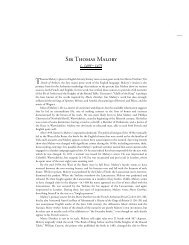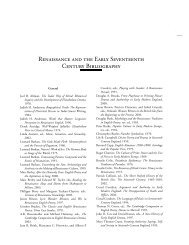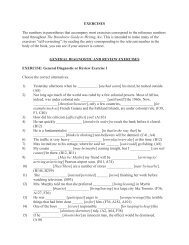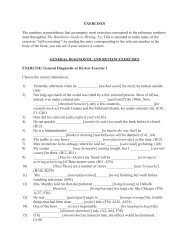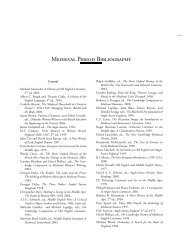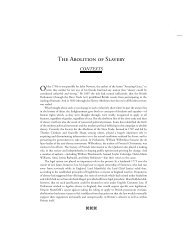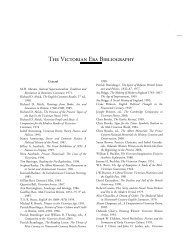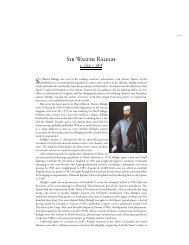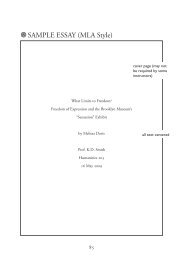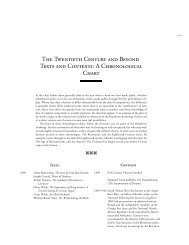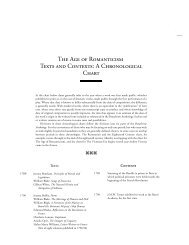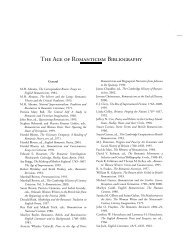Thomas Lodge - Broadview Press Publisher's Blog
Thomas Lodge - Broadview Press Publisher's Blog
Thomas Lodge - Broadview Press Publisher's Blog
Create successful ePaper yourself
Turn your PDF publications into a flip-book with our unique Google optimized e-Paper software.
780<br />
785<br />
Of Scylla’s pride; and then by oath he bound me<br />
To write no more of that whence shame doth<br />
grow,<br />
Or tie my pen to penny-knaves’ 1 delight,<br />
But live with fame, and so for fame to write.<br />
L’ Envoi 2<br />
Ladies, he left me, trust me I mis-say not;<br />
But so he left me as he willed me tell you:<br />
That nymphs must yield when faithful lovers<br />
stray not,<br />
Lest through contempt almighty Love compel you<br />
With Scylla in the rocks to make your biding,<br />
A cursed plague for women’s proud backsliding. 3<br />
—1589<br />
[from Robin the Devil]<br />
The Famous, True, and Historical Life of Robert,<br />
Second Duke of Normandy, Surnamed for His<br />
Monstrous Birth and Behaviour,<br />
Robin the Devil. 4<br />
1 penny-knaves probably a reference to <strong>Lodge</strong>’s less than successful<br />
career writing for the stage, whose least economically and socially<br />
advantaged patrons were often caricatured as also those least able to<br />
appreciate work of substantial literary merit (cf. Hamlet’s tirade<br />
against the so-called “groundlings” [3.2.8-12; 24-28], those who paid<br />
a penny to stand in the yard, the open space in front of the public<br />
stage, to watch performances); there may also be a reference to those<br />
individuals who buy the cheapest and thus least “literary” books and<br />
pamphlets available in the print market.<br />
2 L’Envoi French, “farewell.” In French verse, the “l’envoi” is a concluding<br />
stanza, originally meant as a dedication to a patron, but more<br />
often functioning as a summary of the preceding work.<br />
3 backsliding the falling away from an adopted course, especially of<br />
religious faith or practice; apostasy.<br />
4 The title page continues: “Wherein is contained his dissolute life<br />
in his youth, his devout reconcilement and virtues in his age: Interlaced<br />
with many strange and miraculous adventures. Wherein are<br />
both causes of profit, and many conceits of pleasure.”<br />
T HOMAS L ODGE<br />
5<br />
10<br />
15<br />
20<br />
6<br />
To the Worshipful and True Maecenas 5 of<br />
Learning, Master <strong>Thomas</strong> Smith, 6 T.L.G.<br />
Wisheth All Abundance of Worldly Fortunes<br />
in This Life, and the Benefits of Heavenly<br />
Felicity in the Life to Come.<br />
Seeing in these our days men rather seek the<br />
increase of transitory wealth than the knowledge<br />
of divine wisdom, preferring stuffed bags before<br />
studious books, their pounds before precepts,<br />
losing the true riches of the mind to level at 7 the<br />
transitory allurements of this world, feeding fools<br />
with figs, and philosophers with flouts; 8 I have<br />
among the multitudes of these men made choice<br />
of Your Worship for my patron and Maecenas,<br />
who of a far more happy nature with Theodosius,<br />
honour Appian, 9 and seeing learning almost suppressed<br />
with contempt or discountenanced with<br />
neglect have in this famous city (like a virtuous<br />
member of the same) begun to exile ignorance, to<br />
revive arts. [...] Which virtuous endeavour of<br />
yours (worthy both your name and fortune) shall<br />
in time to come more advance you than they who<br />
tooth and nail labour to purchase lands, which<br />
ordinarily perish through their heirs’ lavishness. It<br />
is true fame which is gotten by virtue, and perfect<br />
virtue to maintain learning, which is so kind to<br />
those that seek after it that in all changes of<br />
fortune, in all miseries of this life and casualties<br />
5 Maecenas Gaius Maecenas (c. 70-8 BCE), influential Roman aristocrat,<br />
statesman, and one of the emperor Augustus’ most trusted<br />
friends; a patron of the arts, Maecenas supported the works of Virgil,<br />
Horace, and Propertius; he introduced Virgil to Augustus.<br />
6 <strong>Thomas</strong> Smith Probably Sir <strong>Thomas</strong> Smith (c. 1556-1609), university<br />
orator (Oxford, 1582-94) and secretary to Robert Devereux, 2nd<br />
earl of Essex.<br />
7 level at aim at.<br />
8 feeding fools with figs i.e., giving fools a delicacy that they will be<br />
unable to appreciate (the equivalent of the proverbial expression,<br />
“Casting pearls before swine” [Matthew 7:6; Tilley P165]); flouts<br />
mocking speeches or actions; pieces of mockery; jeers or scoffs.<br />
9 Theodosius…Appian Appian of Alexandria (fl. 2nd c. CE), Greek<br />
historian of Rome, who wrote the 24 book History of Rome’s Wars;<br />
Theodosius is perhaps Theodosius II (401-50 CE), late Roman<br />
emperor, who founded a university at Constantinople and is responsible<br />
for the legal compilation named after him (the Theodosian<br />
Code).



